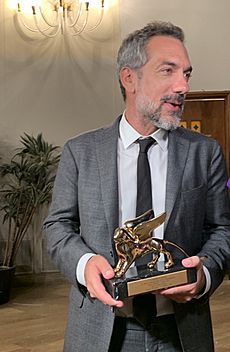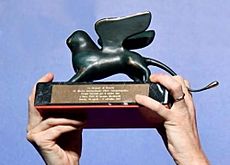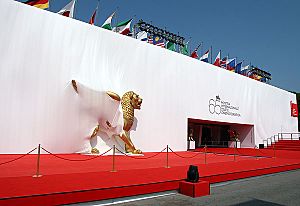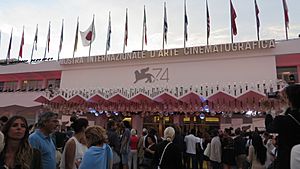Venice Film Festival facts for kids
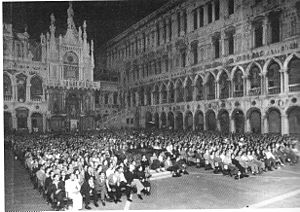
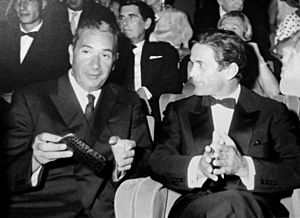
The Venice Film Festival is a festival held in Venice, Italy. It is held every year. It is the world's oldest movie festival.
Founded by Giuseppe Volpi, member of the National Fascist Party and grandfather of famous producer Marina Cicogna in Venice in August 1932, the festival is part of the Venice Biennale, one of the world's oldest exhibitions of art.
The festival is held in late August or early September on the island of the Lido in the Venice Lagoon. Screenings take place in the historic Palazzo del Cinema on the Lungomare Marconi. The festival continues to be one of the world's most popular and fastest-growing.
The 80th Venice International Film Festival was held from 30 August to 9 September 2023.
Contents
Awards
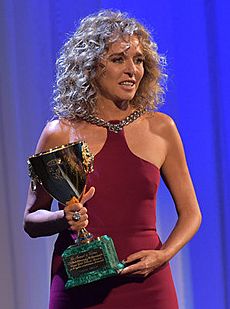
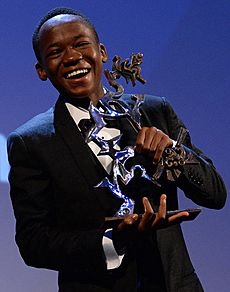
The Film Festival's current awards are:
Official selection: In competition
- Golden Lion (Leone d'Oro), awarded to the best film screened in competition at the festival
- See list of winners at Golden Lion
- Grand Jury Prize, awarded to the second best film screened in competition at the festival
- See list of winners at Grand Jury Prize (Venice Film Festival)
- Silver Lion (Leone d'Argento), awarded to the best director in the competitive section
- See list of winners at Silver Lion
- Special Jury Prize, awarded to the third best film screened in competition at the festival
- See list of winners at Special Jury Prize (Venice Film Festival)
- Volpi Cup (Coppa Volpi), awarded to the best actor/actress
- See – Volpi Cup for Best Actor
- See – Volpi Cup for Best Actress
- Golden Osella, awarded for the Best Screenplay and/or for the Best Technical Contribution (cinematography, music, etc.)
- See list of winners at Golden Osella
- There are other awards that also recognize acting performances:
- Marcello Mastroianni Award, instituted in 1998 in honor of the great Italian actor Marcello Mastroianni who died in 1996. The award was created to acknowledge an emerging actor or actress
- See list of winners at Marcello Mastroianni Award
- Special Lion, awarded for an overall work to a director or actor of a film presented in the main competition section.
Orizzonti section (Horizons)
This section is open to all "custom-format" works, with a wider view towards new trends in the expressive languages that converge in film.
Starting from the 67th edition of the festival, four awards of the Orizzonti section have been established:
- The Orizzonti Award for Feature Films
- The Special Orizzonti Jury Prize (for feature films)
- The Orizzonti Award for Short Film
- The Orizzonti Award for Medium-length Film
More awards were added in the following years:
- The Orizzonti Award for Best Director
- The Orizzonti Award for Best Actor
- The Orizzonti Award for Best Actress
- The Orizzonti Award for Best Screenplay
Giornate degli Autori
The Giornate degli Autori (formerly Venice Days) is an independent and parallel section founded in 2004 in association with Venice Film Festival. It is modeled on the Directors' Fortnight at the Cannes Film Festival. Anac and 100autori which are both associations of Italian film directors and authors are engaged to support and promote the Giornate.
The awards under this sections are:
- Giornate Degli Autori (GDA) Award
- Label Europa Cinema Award
- BNP Paribas People's Choice Award
Lion of the Future (Luigi De Laurentiis)
All the debut feature films in the various competitive sections in the Venice Film Festival, whether in Official Selection or Independent and Parallel Sections, are eligible for this award. The winner will be awarded a prize of US$100,000, which to be divided equally between the director and the producer.
Glory to the Filmmaker Award
Jaeger-LeCoultre Glory to the Filmmaker Award, organized in collaboration with Jaeger-LeCoultre (2006-2020) and Cartier (2021- today). It is dedicated to personalities who have made a significant contribution to contemporary cinema.
This is the list of winners:
| Year | Director | Nationality |
|---|---|---|
| 2006 | Kitano Takeshi | Japan |
| 2007 | Abbas Kiarostami | Iran |
| 2008 | Agnès Varda | France |
| 2009 | Sylvester Stallone | United States |
| 2010 | Mani Ratnam | India |
| 2011 | Al Pacino | United States |
| 2012 | Spike Lee | United States |
| 2013 | Ettore Scola | Italy |
| 2014 | John Ford | United States |
| 2015 | Brian De Palma | United States |
| 2016 | Amir Naderi | Iran |
| 2017 | Stephen Frears | United Kingdom |
| 2018 | Zhang Yimou | China |
| 2019 | Costa-Gavras | Greece |
| 2020 | Abel Ferrara | United States |
| 2021 | Ridley Scott | United Kingdom |
| 2022 | Walter Hill | United States |
| 2023 | Wes Anderson | United States |
Past awards
Mussolini Cup (Coppa Mussolini)
The Mussolini Cup was the top award from 1934 to 1942 for Best Italian and Best Foreign Film. Named after Italy's dictator Benito Mussolini, it was abandoned upon his ousting in 1943.
Mussolini Cup for Best Italian film
| Year | Film | Original title | Director(s) |
|---|---|---|---|
| 1934 | Loyalty of Love | Teresa Confalonieri | Guido Brignone |
| 1935 | Casta Diva | Carmine Gallone | |
| 1936 | Lo squadrone bianco | Augusto Genina | |
| 1937 | Scipio Africanus: The Defeat of Hannibal | Scipione l'africano | Carmine Gallone |
| 1938 | Luciano Serra, Pilot | Luciano Serra pilota | Goffredo Alessandrini |
| 1939 | Cardinal Messias | Abuna Messias | Goffredo Alessandrini |
| 1940 | The Siege of the Alcazar | L'assedio dell'Alcazar | Augusto Genina |
| 1941 | The Iron Crown | La corona di ferro | Alessandro Blasetti |
| 1942 | Bengasi | Augusto Genina | |
Mussolini Cup for Best foreign film
| Year | Film | Original title | Director(s) | Country |
|---|---|---|---|---|
| 1934 | Man of Aran | Robert J. Flaherty | United Kingdom Irish Free State |
|
| 1935 | Anna Karenina | Clarence Brown | United States | |
| 1936 | Der Kaiser von Kalifornien | Luis Trenker | Germany | |
| 1937 | Life Dances On | Un carnet de bal | Julien Duvivier | France |
| 1938 | Olympia | Leni Riefenstahl | Germany | |
| 1939 | No Award Given | |||
| 1940 | Der Postmeister | Gustav Ucicky | Germany | |
| 1941 | Ohm Krüger | Hans Steinhoff | Germany | |
| 1942 | The Great King | Der große König | Veit Harlan | Germany |
Great Gold Medals of the National Fascist Association for Entertainment
"Le Grandi Medaglie d’Oro dell’Associazione Nazionale Fascista dello Spettacolo" in Italian.
This was awarded to Best Actor and Best Actress. It was later replaced by the Volpi Cup for actors and actresses.
The first time this prize was awarded to Katharine Hepburn for her role in Little Women by George Cukor.
Audience Referendum
In the first edition of the festival in 1932, due to the lack of a jury and the awarding of official prizes, a list of acknowledgements was decided by popular vote, a tally determined by the number of people flocking to the films, and announced by the Organizing Committee. From this, the Best Director was declared – Russian Nikolai Ekk for the film Road to Life, while the film by René Clair À Nous la Liberté was voted Best Film.
Award for Best Director
| Year | Director(s) | Film | Original title |
|---|---|---|---|
| 1935 | King Vidor | The Wedding Night | |
| 1936 | Jacques Feyder | Carnival in Flanders | La Kermesse Héroïque |
| 1937 | Robert J. Flaherty and Zoltan Korda | Elephant Boy | |
| 1938 | Carl Froelich | Heimat | |
See also
 In Spanish: Festival Internacional de Cine de Venecia para niños
In Spanish: Festival Internacional de Cine de Venecia para niños
- Venice Biennale
- Rome Film Festival


